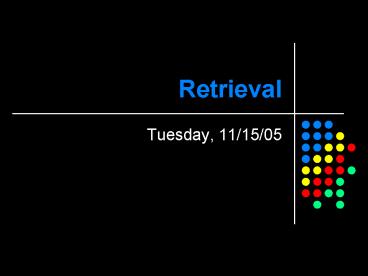Retrieval PowerPoint PPT Presentation
Title: Retrieval
1
Retrieval
- Tuesday, 11/15/05
2
From last time
- Two types of models seek to explain how memories
are stored - Psychological models knowledge is organized
according to a hierarchy or an interconnected
network.
3
(No Transcript)
4
(No Transcript)
5
From last time
- Two types of models seek to explain how memories
are stored - Psychological models knowledge is organized
according to a hierarchy or an interconnected
network. - Physiological models knowledge is represented
by changes in the activity at synapses between
neurons.
6
(No Transcript)
7
Retrieval
- What factors influence the process of retrieval?
- The distinctiveness of the memory
- Distinct events are usually better remembered.
- Lack of similarity to other memories reduces the
chance of retrieving of an incorrect memory.
8
- Practice with retrieval
- Having engaged in previous retrieval of the same
information facilitates retrieval. - More frequent practice usually leads to more
accurate retrieval.
9
- The effectiveness of the retrieval cues
- Associations preexisting associations between
concepts can be used as retrieval cues. - Cues present during encoding cues available at
the time of encoding (context, internal states,
cognitive operations, etc.) are often useful
retrieval cues.
10
- Contextual learning memories can become
associated with the contexts in which they are
encoded.
11
Godden Baddeley (1975)Scuba Diving study
12
- State-dependent learning in some cases an
internal state match between study and test
facilitates retrieval.
13
Goodwin et al. (1969)Alcohol study
14
Eich et al. (1975)Marijuana study
15
- Mood-dependent recall the mood present during
encoding can act as a retrieval cue during
recall. - If sad during encoding, recall is better when sad
at test. - If happy during encoding, recall is better when
happy at test.
16
Eich Metcalfe (1989)Mood study
17
- Mood-congruent memory recall of happy memories
is better when happy, and recall of sad memories
is better when sad. - Match between current state and the emotional
content of the memories rather than the state
present during encoding.
18
See you Thursday
PowerShow.com is a leading presentation sharing website. It has millions of presentations already uploaded and available with 1,000s more being uploaded by its users every day. Whatever your area of interest, here you’ll be able to find and view presentations you’ll love and possibly download. And, best of all, it is completely free and easy to use.
You might even have a presentation you’d like to share with others. If so, just upload it to PowerShow.com. We’ll convert it to an HTML5 slideshow that includes all the media types you’ve already added: audio, video, music, pictures, animations and transition effects. Then you can share it with your target audience as well as PowerShow.com’s millions of monthly visitors. And, again, it’s all free.
About the Developers
PowerShow.com is brought to you by CrystalGraphics, the award-winning developer and market-leading publisher of rich-media enhancement products for presentations. Our product offerings include millions of PowerPoint templates, diagrams, animated 3D characters and more.

